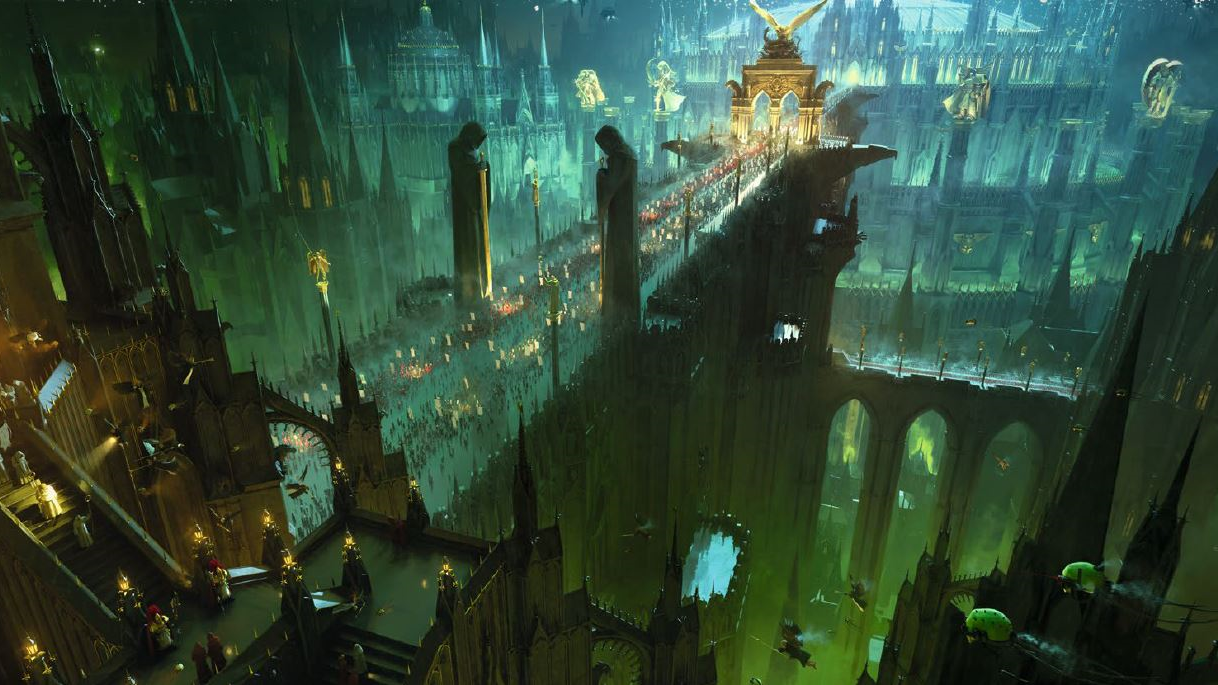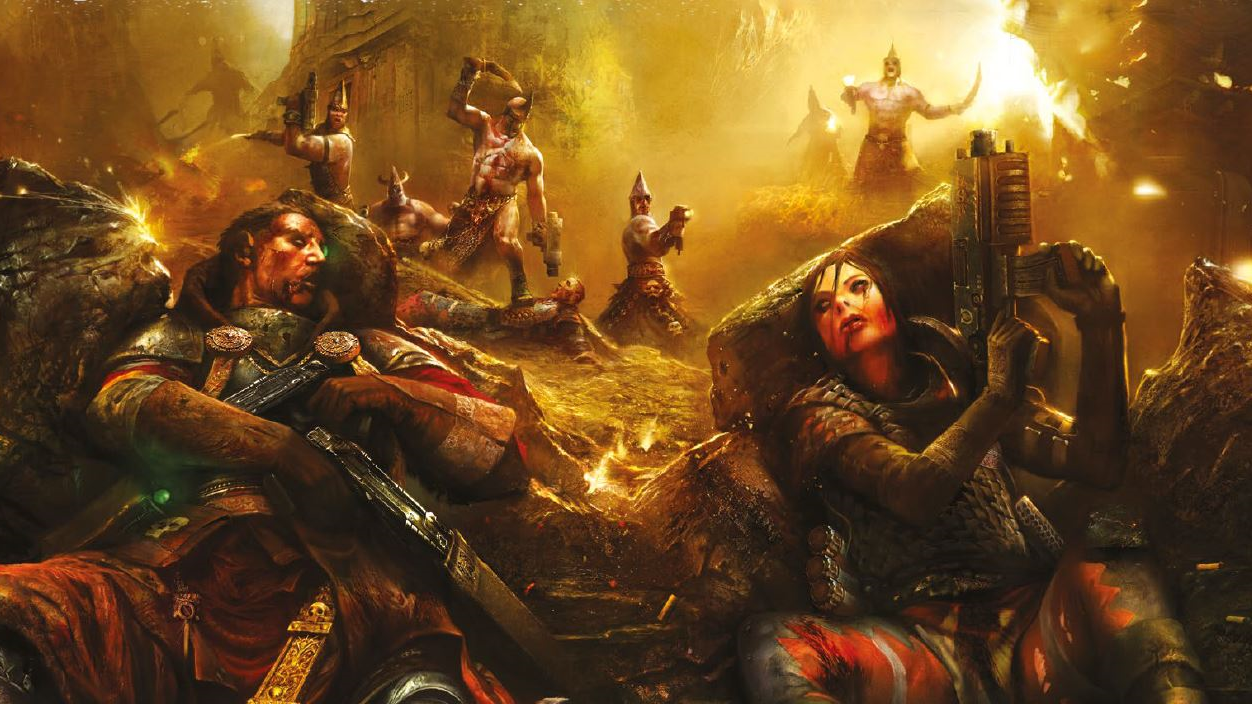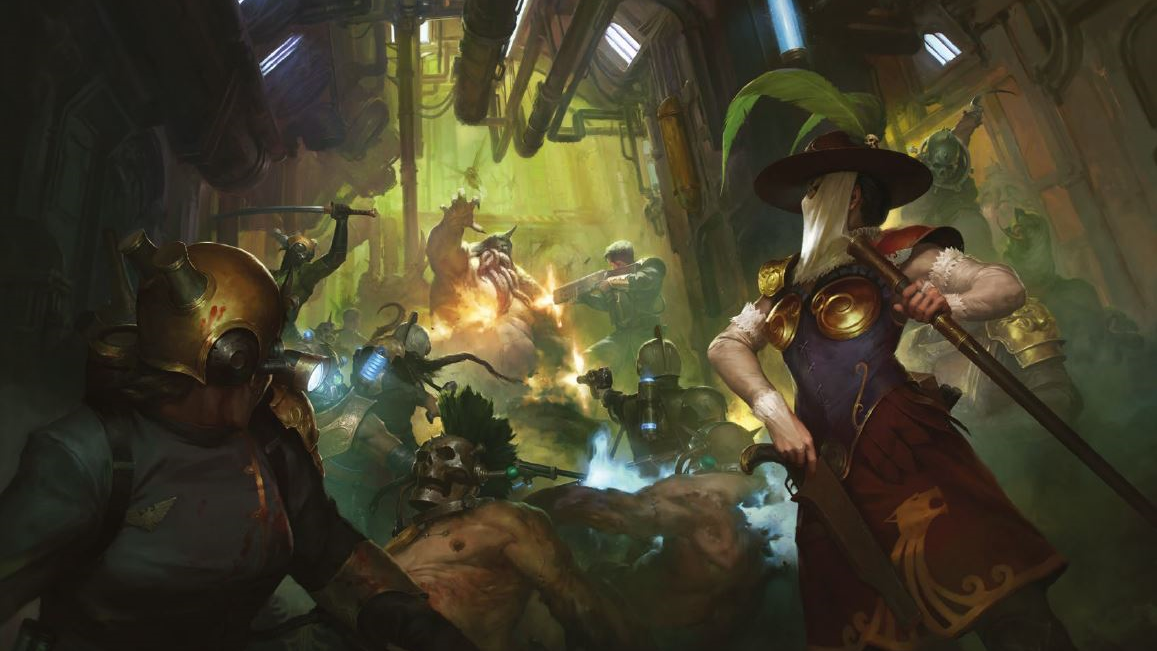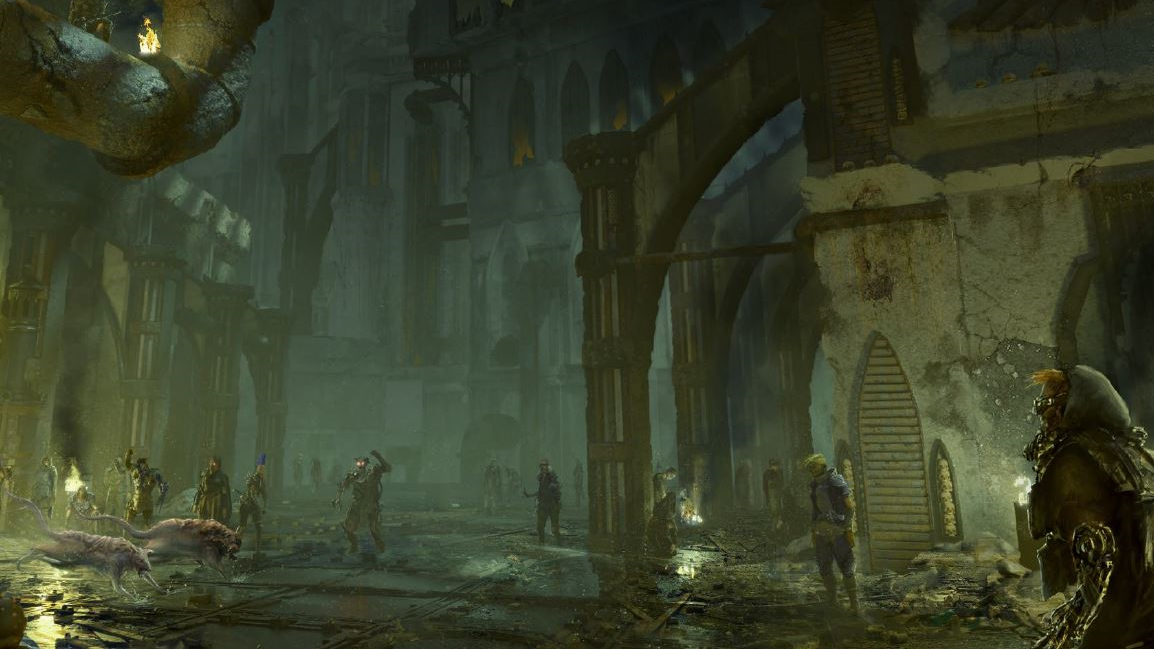The new Warhammer 40,000 tabletop RPG is like playing D&D in a horrifying galaxy where everything wants to kill you
Imperium Maledictum is dense, messy, and truly authentic to Games Workshop's grimdark setting.
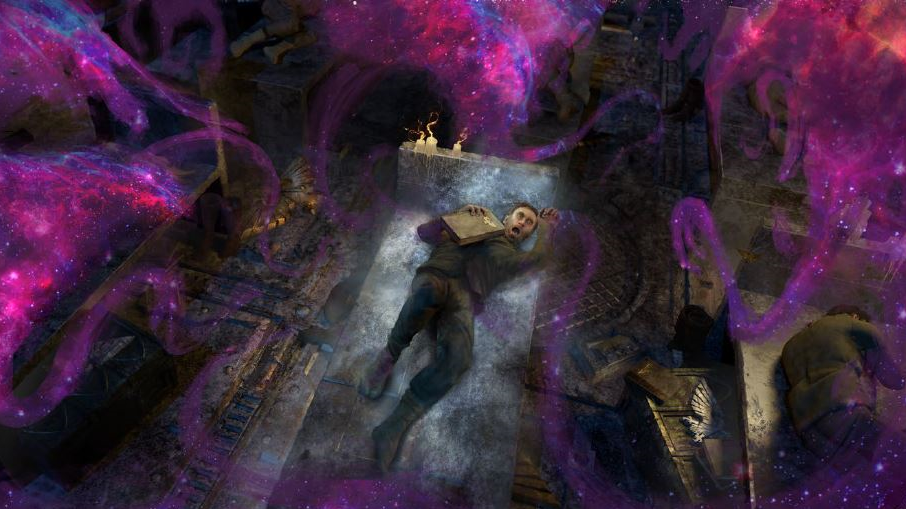
The Warhammer 40,000 universe is one of the bleakest sci-fi settings ever conceived. In the crumbling, fascist empire of man, beset on all sides by enemies, cosmic horrors, and literal daemons, it's bad enough being a 10 foot super soldier—imagine just being a regular person.
Well, that's essentially the premise of Imperium Maledictum, the latest Warhammer RPG from publisher Cubicle 7. Acting as a spiritual successor to the classic Dark Heresy, it casts players as mere cogs in the great machine that is the Imperium—thieves, apprentices, clerks, acolytes, and other lower-ranking fodder. As these squishy underdogs, they're tasked by their aloof and powerful patrons with important missions, including everything from rooting out heresy, to pulling off daring heists, to investigating murders.
Imperial march
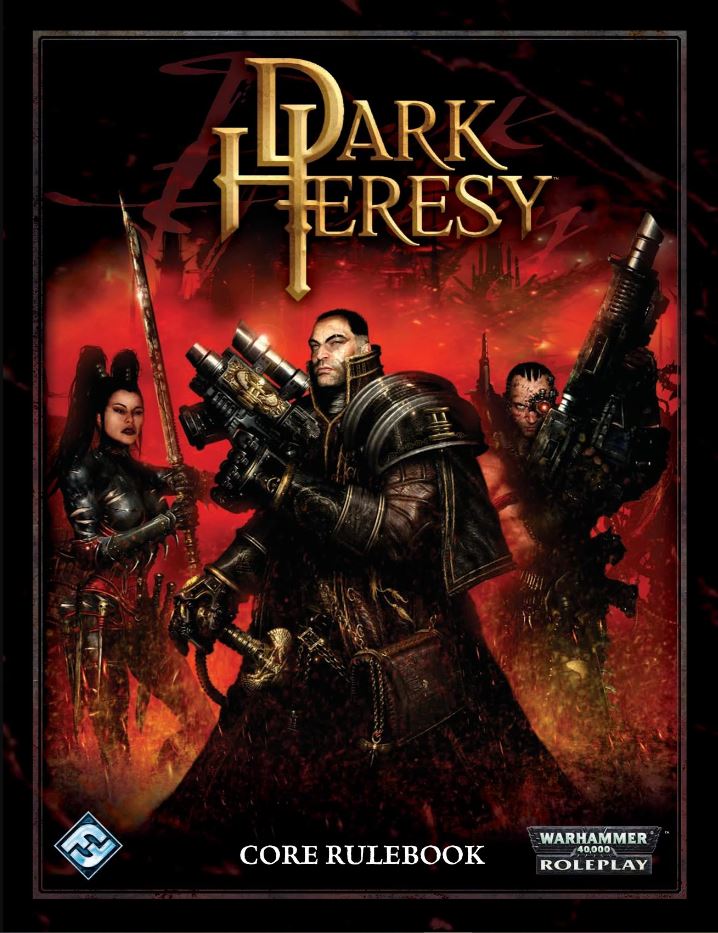
The original Dark Heresy, in which you played as hapless agents of the Inquisition, was created by Games Workshop itself in 2008, though it was given scant support until it was handed over to tabletop giant Fantasy Flight Games, who released a second edition in 2014. It's a beloved classic, though like Imperium Maledictum it was a dense and intimidating game.
The result is a sort of underdog sci-fi noir, where much of the drama is intended to arise from your interactions with the key factions of the Imperium. Where Dark Heresy was concerned primarily with the Inquisition, here they're just one of many organisations you might be working for, alongside, or against—from the cyborg engineers of the Adeptus Mechanicus, to the psychic navigators of the Astra Telepathica, to the void-farers of the Imperial Navy.
Hailing from one of these factions, player character options cover a huge range of Warhammer 40,000 archetypes. Though you'll always be low-ranking and fairly weak to start out, it's still possible to fill roles as exotic as psyker, pariah, Sister of Battle in training, or death cult assassin. The character creation and advancement rules are flexible enough, in fact, to be stretched in almost any direction you can imagine, within the confines of being a (human) Imperial citizen.
And that kind of sums up the intent of the game—what it's trying to do with this core book is cover the full breadth of human society in Warhammer 40,000, in pretty exhaustive detail. It's astonishingly comprehensive—its almost 100 page breakdown of the lore of the Imperium and the game's specific setting, the Macharian sector, is about as complete a primer as you could imagine. The flip side is this is a dense tome, one that can be intimidating just to read your way through, let alone use to play a game. Dedicated Warhammer 40,000 fans who love having all the information at their fingertips are well-served, but those less familiar with the setting, or who simply prefer less homework in their RPGs, will likely feel overwhelmed.
Forbidden knowledge
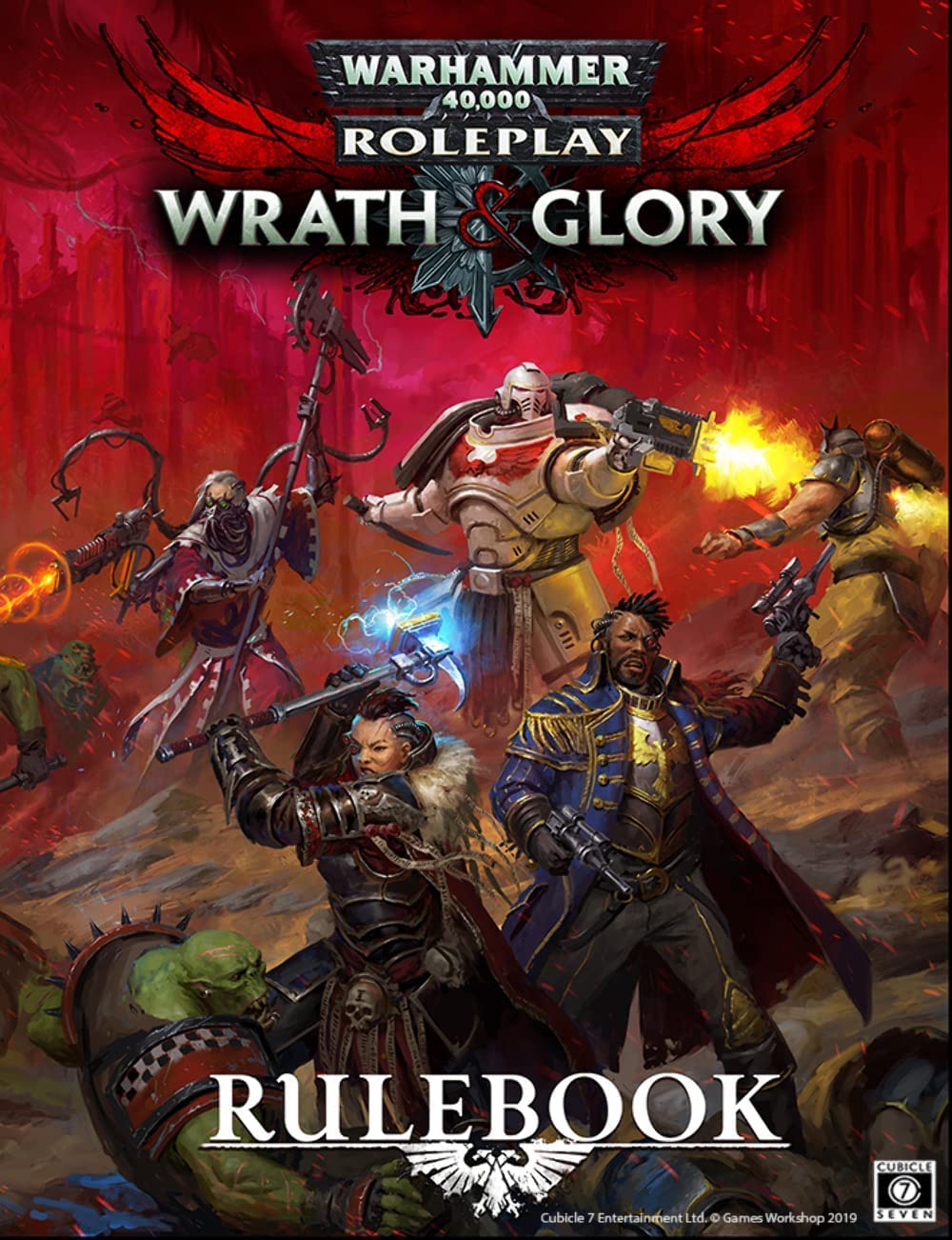
This isn't Cubicle 7's first Warhammer 40,000 TTRPG—it also publishes Wrath & Glory. This more heroic take on the setting has a lighter, more action-packed system that allows you to play the heroes of the setting, such as Space Marines, Inquisitors, and Rogue Traders. If Imperium Maledictum sounds a bit too grim for you, this might be your game.
It's a similar situation with the game's rules set. Building on the core of Dark Heresy's d100 system, it incorporates some clever modern streamlining into the established foundation of percentile rolls and characteristics derived from the Warhammer 40,000 wargame. But it's still a very crunchy system, with a lot of moving parts. Those who enjoy their RPGs full of detail, with an answer for every situation and a mechanic to go with every theme will feel at home, but I suspect many will struggle to keep up with the countless modifiers and subsystems. For example: in combat, players have 22 generic actions they can take on top of any character-specific abilities or gear they may have—if that's not a recipe for analysis paralysis, I don't know what is.
Wading through these complexities is made more difficult by the book's strange layout of sections. It's 150 pages before you reach the core rules, for example. You're reading about how psychic powers work and what effects different weapons have before you know how a basic roll works. Superiority, a system of bonuses that can be gained in combat, is explained before any of the combat rules they affect.
Keep up to date with the most important stories and the best deals, as picked by the PC Gamer team.
The print version won't be releasing until the winter, effectively making this a sort of early access period.
Wrestling over 350 pages of Warhammer together into a usable book is a tricky task, but Imperium Maledictum does feel notably chaotic even compared to Cubicle 7's other games set in Games Workshop's universes. And with no index, it could be a nightmare finding the rule you want at the table during a tense moment.
Unfortunately that sense of chaos extends to several major editing issues as well. While the frequent spelling errors and formatting inconsistencies are just annoying, a few mistakes are harder to work around—such as an important table missing from the character creation section. It should be noted, however, that there is still time for these errors to be fixed—while the PDF of the game is currently available, the print version won't be releasing until the winter, effectively making this a sort of early access period. Updates to the PDF should be released over the coming months, hopefully fixing these mistakes before they're immortalised in paper—and digital purchasers will get those updates for free, of course.
Deadly dystopia
While it does have rough edges in its current form, what Imperium Maledictum absolutely nails is the atmosphere of the Warhammer 40,000 setting. This is Games Workshop's galaxy at its most bleak and oppressive, and your role as those close to the bottom of the ladder casts familiar elements in a terrifying new light. On the battlefields of the wargame, a unit of Plaguebearers is a routine strategic obstacle—in Imperium Maledictum, just one such daemon could tear right through your party and render even the survivors mutated or insane.
Brutal critical hit tables make even just fighting your fellow man a dangerous prospect—it only takes one unlucky roll to lose a limb or even your life. And Emperor forbid a psyker push their powers too far—a psychic power gone wrong can cause a rain of blood, cost you your soul as a daemon takes over your body, or simply make you explode, taking out you and everyone around you. Expendable Fate points let you cheat death a handful of times, but no one's luck lasts forever.
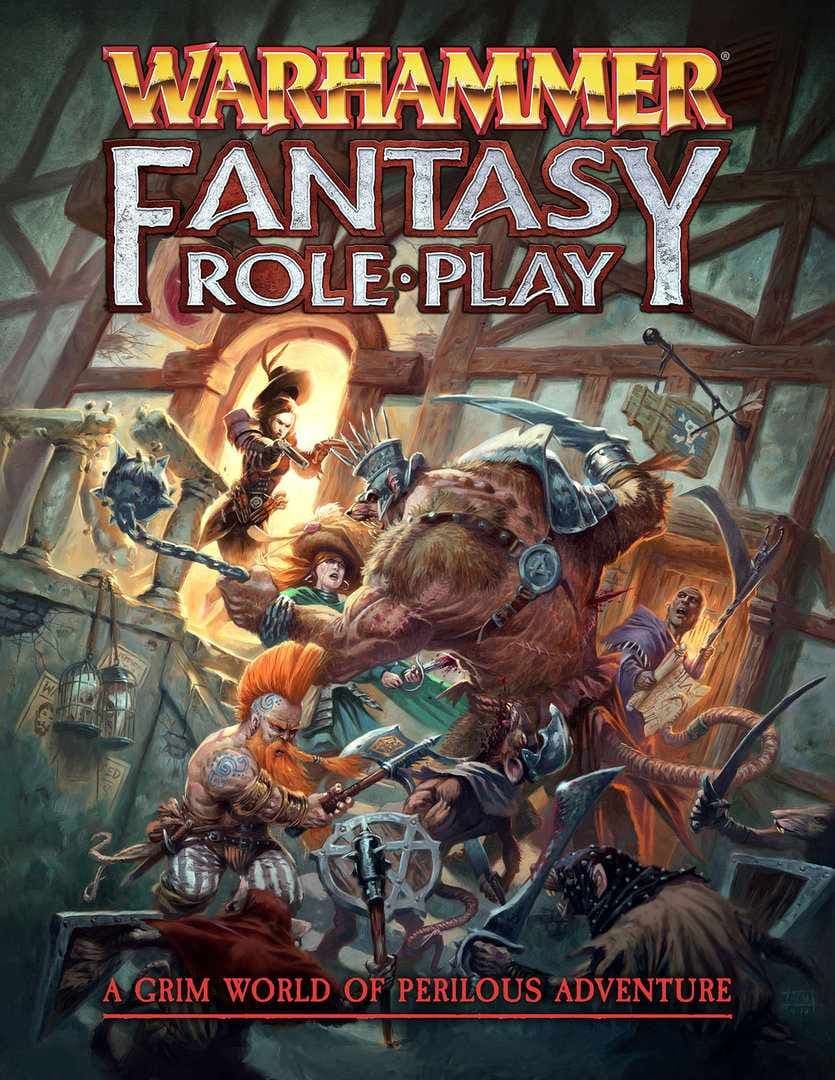
Currently in its 4th edition, also published by Cubicle 7, Warhammer Fantasy Roleplay is essentially the Old World equivalent of Imperium Maledictum. Playing as lowly rat catchers, merchants, town guards, and the like, you struggle to try and survive a world full of monsters, disease, and (allegedly) Skaven.
That doesn't mean playing the game is a miserable experience—far from it. For players with the right mix of determination and a dark sense of humour, the joy of Imperium Maledictum is in finding ways to succeed despite the terrible odds. Cunning parties will never fight fair, employing every dirty trick and contrived plan they can to survive. In this game's predecessor, Dark Heresy, I once played in a session where we were expected to battle a monstrous Bloodletter; instead of fighting it head-on and meeting a pretty certain end, we spent an entire combat finding a way to trick it into falling off the roof of a 30 storey building. Imperium Maledictum feels primed for the same sort of triumphant anecdotes—and, as in videogames like Dark Souls, when the odds are stacked against you, victory tastes so much sweeter.
Feeling superior
The game even codifies this style of play. The new Superiority system is a set of rules for gaining advantages in a fight by doing your homework—rewarding investigating your enemy, discovering their strengths and weaknesses, and tipping circumstances subtly in your favour with direct bonuses in the resulting battle. It's a clever addition, because it allows a well-prepared party moments of real power, a relief from always feeling like the underdog—but at the same time, it makes those times where you get surprised or ambushed and can't claim those buffs even more frightening.
In some ways it stretches itself too far, but no one could argue that the material here is too thin.
And for GMs used to writing their own adventures, the book provides a wonderfully expansive amount of adventure hooks, locations, and characters to fuel them. The current status quo of the Warhammer 40,000 universe—the Imperium split in half and pitched into confusion and chaos by a daemonic rift in space—is a perfect stage for adventure. Imperium Maledictum doesn't waste a drop of that potential as it lays out the countless strange and dangerous happenings across the Macharian sector. In trying to cover possible campaigns for all nine of the wildly different factions, in some ways it stretches itself too far, but no one could argue that the material here is too thin. Based on Cubicle 7's past form, GMs who prefer pre-written campaigns will be well-served, too—expect loads of adventures to come out, beginning with an Imperium Maledictum starter set due later this year.
For better and worse, this is a Warhammer 40,000 RPG of pure excess. It's just a lot of everything—rules for every situation, endless lore, countless possible characters, a million adventure possibilities. It won't be to everyone's tastes—even seasoned Dungeons & Dragons players and GMs may feel intimidated by what's on offer here. But for those who breathe lore and eat crunchy rules for breakfast, this is as expansive and genuinely grimdark as Warhammer roleplaying gets.
The Imperium Maledictum core book is available buy in PDF from Cubicle 7 and DriveThruRPG, or you can preorder the print version and receive a PDF for free.

Formerly the editor of PC Gamer magazine (and the dearly departed GamesMaster), Robin combines years of experience in games journalism with a lifelong love of PC gaming. First hypnotised by the light of the monitor as he muddled through Simon the Sorcerer on his uncle’s machine, he’s been a devotee ever since, devouring any RPG or strategy game to stumble into his path. Now he's channelling that devotion into filling this lovely website with features, news, reviews, and all of his hottest takes.
